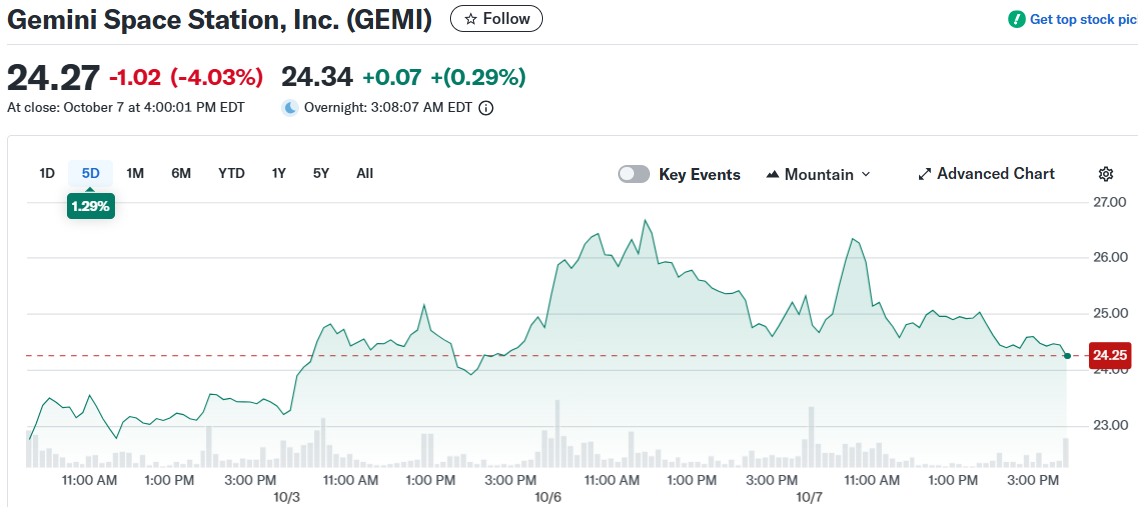TLDR
- Gemini Space Station stock trading around $25 with analyst price targets averaging $30 to $31.50, implying 20% to 30% upside from current levels
- The company’s crypto rewards credit card saw sign-ups jump from 8,000 in 2024 to nearly 31,000 by August 2025, with half of cardholders becoming active exchange traders
- Gemini secured MiCA licensing in the European Union in August 2025, allowing expansion into staking and derivatives across the bloc
- Wall Street coverage shows six buy ratings and five hold ratings following the end of the IPO blackout period
- Stock debuted at $28 last month, peaked at $46, but dropped to post-IPO low of $22.25 before recovering slightly
Gemini Space Station began trading last month after its initial public offering. The stock opened at $28 per share and reached $46 on the first day of trading.

The cryptocurrency exchange has since fallen to around $24 per share. Last week the stock hit a post-IPO low of $22.25.
Wall Street analysts initiated coverage this week after the IPO research blackout expired. Six analysts gave the stock buy ratings while five issued hold ratings.
The average price target from analysts sits at approximately $30 to $31.50. This represents a potential gain of 20% to 30% from current trading levels.
Mizuho Securities set a $30 price target for the stock. Needham analyst John Todaro issued the highest target at $42 per share.
Credit Card Drives User Growth
The Gemini Credit Card has become a primary growth engine for the company. Sign-ups increased from roughly 8,000 in 2024 to nearly 31,000 by August 2025.
Gemini credit card holders earning BTC for at least 1 year saw rewards appreciate 277% on average 📈 pic.twitter.com/27R6wJ5El7
— Gemini (@Gemini) October 7, 2025
The card allows users to earn bitcoin, ether, or other cryptocurrencies as cashback rewards. Rewards are deposited directly into users’ Gemini exchange accounts.
Analysts Dan Dolev and Alexander Jenkins from Mizuho described this as creating a “flywheel effect.” About half of cardholders convert into monthly active traders on the exchange.
Cantor Fitzgerald analyst Brett Knoblauch noted nearly 45,000 card sign-ups occurred in July and August alone. The company appears on track to triple its user base in 2025.
The card charges no annual fee and requires no minimum balance. Users can adjust which cryptocurrency tokens they receive as rewards.
European Expansion Through MiCA License
Gemini obtained licensing under the European Union’s Markets in Crypto-Assets framework in August. The MiCA license enables the company to offer regulated services across EU member states.
The license permits Gemini to expand into staking services and cryptocurrency derivatives. These products were previously unavailable in European markets.
KBW analysts issued a more cautious assessment despite the growth opportunities. The firm acknowledged Gemini’s growth profile exceeds its peer group.
However, KBW warned the company may remain unprofitable throughout the forecast period. This contrasts with the more optimistic views from other analysts.
Gemini’s stock performance lags behind other recent crypto IPOs. Circle Internet Group, Bullish, and Galaxy Digital have all seen stronger post-IPO gains.
Larger competitors Coinbase and Robinhood have posted strong returns in 2025. Coinbase shares are up more than 50% while Robinhood has gained nearly 300%.
The Winklevoss twins, Cameron and Tyler, run Gemini. The company recovered from reputational damage in 2022 when customer assets were frozen after the FTX collapse.
Gemini eventually recovered more than $2 billion for investors through lawsuits. The company paid approximately $50 million from its own funds to make customers whole.
Monthly transacting users have grown as the platform regains customer trust. Nasdaq made a strategic investment in the company around the time of its public offering.
Truist Securities analyst Matthew Coad suggested the post-IPO weakness presents a buying opportunity. His price target of $31 aligns with the analyst consensus.
The company has increased marketing investments in 2025 to support card growth. Federal regulators now include crypto supporters in leadership positions including Paul Atkins at the SEC.






